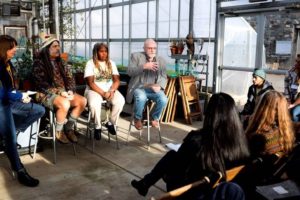An Elder Statesman of Sustainable Ag Looks to the ‘Regenerative Generation’

When it comes to farming organically and building resilient, sustainable agricultural systems, Fred Kirschenmann is a prominent and oft-awarded elder statesman. And while you might expect him to be reflective (he’ll be 85 on February 4), the pioneering organic farmer is firmly forward-thinking.
Kirshchenmann is president of the board at Stone Barns Center for Food and Agriculture, a regenerative agriculture farm and educational center located about 30 miles north of New York City. During an interview with Civil Eats at the center’s 2019 Young Farmers Conference in early December, Kirshchenmann referenced authors to illustrate the future of agriculture. Jared Diamond, for example, studied past civilizations to find out what caused some to thrive while others collapsed.
“The conclusion he came to was that those civilizations that recognized that changes were on the way and got a head start preparing for those changes—they were the ones that thrived,” Kirschenmann said. “Those that failed in that exercise were the ones that tended to collapse. And when I read that, I thought, ‘That’s an important lesson for us, because we do know that changes are on the way.’”
But Kirschenmann is not just observing changes related to the economic and environmental viability of farming sustainably—he’s living them.
Over the past few years, political maneuvering in Iowa resulted in a major loss of state research funding for the pioneering Leopold Center for Sustainable Agriculture based out of Iowa State University, where he is the distinguished fellow.
At his 1,800-acre, certified organic grain farm in south-central North Dakota, he was forced to rethink the crop rotation system after the market for buckwheat collapsed. And at a time when farm succession is one of the biggest challenges facing agriculture, he’s working on transferring ownership of the farm to the family that’s been working the land for many years. MORE